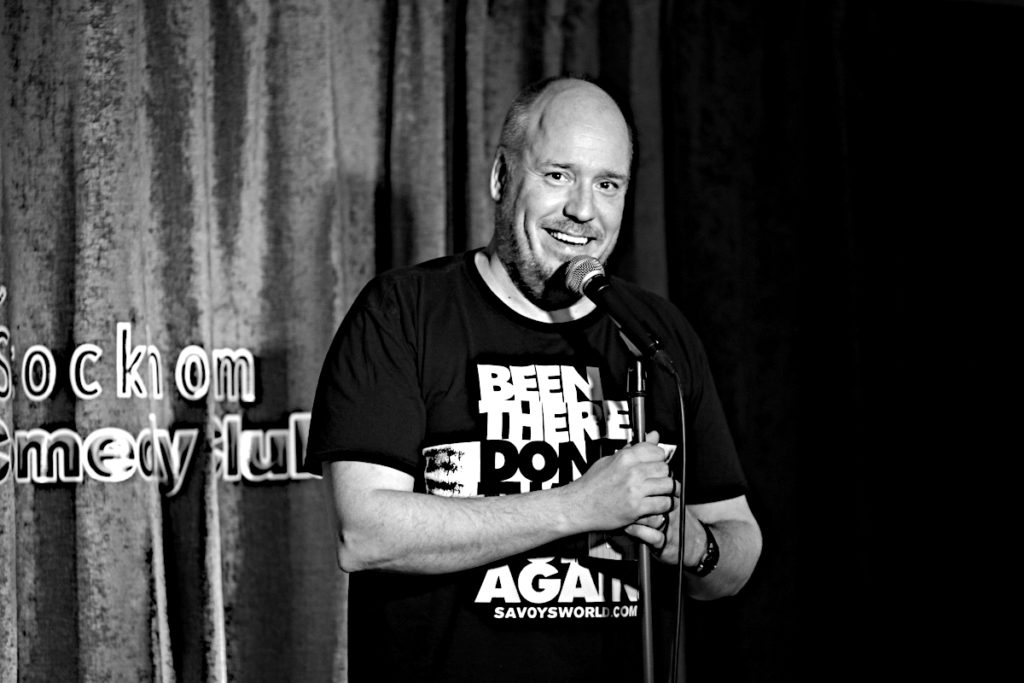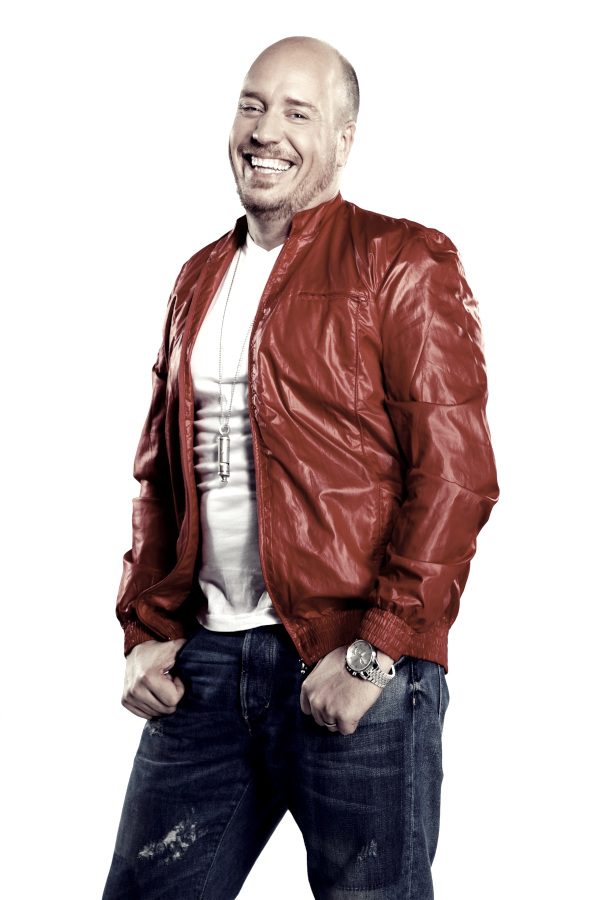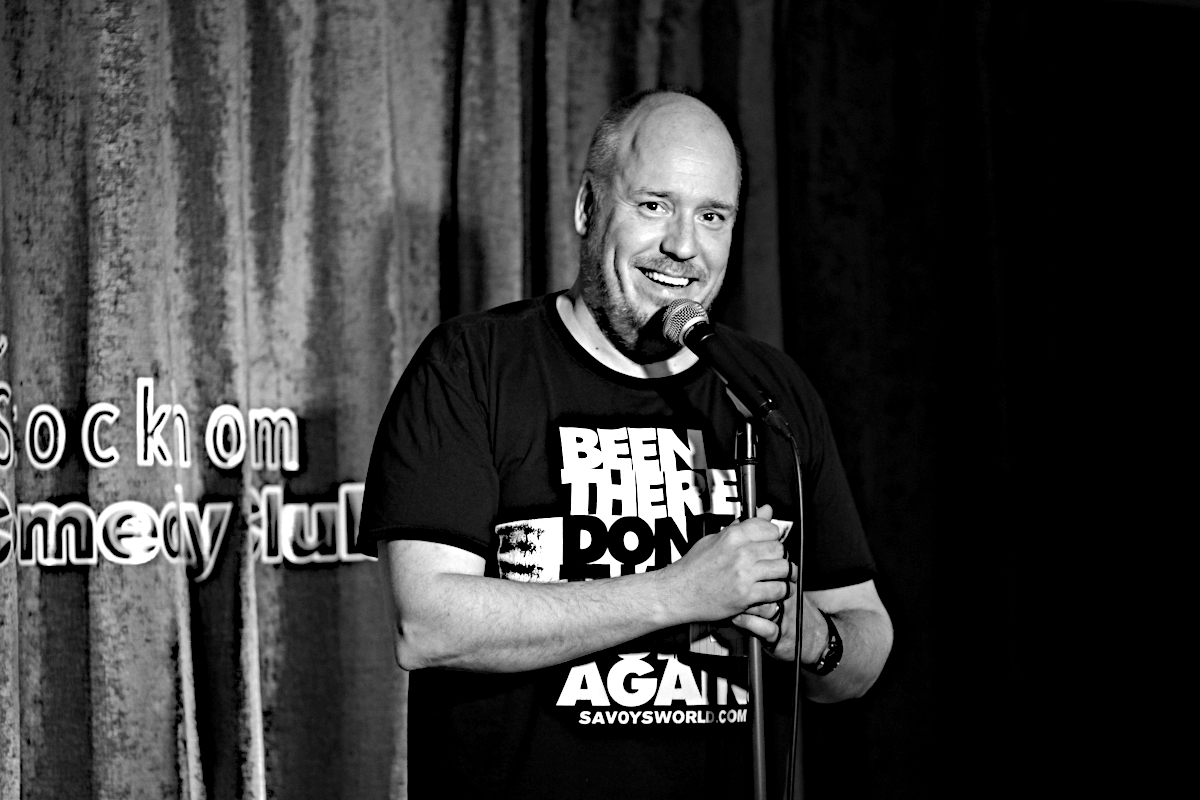
When I started Setup/Punchline, one of my goals was to also highlight different stand-up scenes from different countries. First I eagerly targeted Sweden, a country I maintain a mild passion for. So I was happy to find Janne Westerlund, an iridescent comic person working in the borderlands of different comic genres and traditions. Right after we talked, the Corona virus kicked in and brought comedy scenes everywhere to an abrupt halt. Also in Sweden, which is known for handling the virus with few restrictions, all shows were cancelled or postponed. At the time being (early September ’20) indoor shows are allowed with a maximum of 50 people. In any case, I am eager to share the interview with Janne. It weaves together our talk and some answers he gave me via e-mail and was shortened and condensed for clarity.
Setup/Punchline: Janne, I’m afraid people in Germany aren’t very well informed about Swedish stand-up comedy. Can you give them a little background about you?
Janne Westerlund: I am a pioneer in Swedish stand-up and also the owner of a few comedy clubs in Stockholm: the Stockholm Comedy Club with three venues in town and one club in Norrtälje, north of Stockholm. I am the heart and soul and backbone of Swedish comedy. Is this too much? Or maybe just the backbone. How does that sound?
I don’t know. What is Swedish comedy like?
Pretty much anything goes. Before stand-up came to Sweden comedy was more like funny theatre: sketch comedy, prank calls, wigs. If you wanted to be funny in the 70s and 80s you had to wear a wig, a fake nose, a fake beard and play out some characters. Then you had stand-up with one person, one mic, no props and a variety of styles. Anybody could get a mic and start talking and say whatever you want to say. That was the cool thing.

Is that how you started?
When I was 15 I had a theatre teacher who told me: Since you can’t read the lines in the script, you should do stand-up comedy. I hadn’t heard the term before. There was no stand-up in Europa at that time. But it stuck to me. Then I saw Eddie Murphy’s specials Delirious and Raw. And I realized: I would like to do that! I tried it out and immediately got booked. I was just out of school, I was a nobody! But then you realize: You can work with this, well then, let’s do it.
What was the just graduated comedian Janne Westerlund like?
Oh, it was wild. I was young, I had a leather jacket and I had a mullet like an ice hockey player. I was so cool, at least in my own mind.
What were your influences?
I already mentioned Eddie Murphy. There was John Belushi and stuff from Saturday Night Live. Apart from that, not much. The great thing about stand-up is, the audience is listening to your thoughts, to your ideas. They are eating out of your hand and you feel this special kind of rush. It’s like when you are out surfing and waiting for the perfect wave. Then it comes – and you take it and ride it as long as you can. It’s the same with laughter. And then you wait for the next wave.
You talked about funny theatre comedy before. Was that the state of the art when you started?
There had been a wave of stand-up before that rather followed a British tradition. Pubs and smaller restaurants were the venues. I got in on the second wave. We were a group of younger comedians who wanted to do everything bigger, better, more American. Like Eddie Murphy. We didn’t have the content, but the self-confidence. We had to have bigger rooms. Like with Kiss, you know. They started in smaller venues, but they almost set the places on fire. So were our shows. We started with a DJ playing music, there was light, there was smoke. We were the first guys who were taking Swedish stand-up onto bigger stages. The theatre people didn’t like this, it was a big controversy in the 90s.
What did they say?
Like always, when the younger generation comes in with enthusiasm and new ideas, the elders say no. It was the same with me: When I had done my 20 years and new comics were coming in, posting stuff on Instagram, doing their thing, first I thought: No, you have to do this properly on tv and radio! But the thing is: No, you don’t. That’s just how the art evolves.
You are not only a comedian, but also a promoter and club owner. How did you come to this?
Today there are around 20 comedy clubs in the Stockholm area. When I started, there was only one in the north of the city. Quite a distance if you lived in the south. So, pretty fast we started our own club there. Just to be able to perform. Every month you had your steady gig and every third week you had to do the mc-ing. It was the perfect school because you needed a lot of ad-libbing to fill the time. You didn’t have enough material. And from there on we founded a couple more clubs like Norrabrunn. We have been doing a lot of things, now we also have a little hotel.
Stå-upp Komikers livet
Janne Westerlund (*1971) is a stand-up comedian, radio host, voice actor and comedy club owner from Sweden. He performs comedy in Swedish, English and Finnish. In the 1990s he was part of the group Stockholm Live, together with comedians Özz nujen, Jakob Öqvist and Shan Atci. In the wake of 80s comedy from the USA the group stood back from traditional Swedish comedy with its more costume- and stage-play-like appeal and tried to take a modernized stance with bigger and louder events. Apart from performing as a comedian, Westerlund is today running the Stockholm Comedy Club with its three venues and a comedy club in the small coastal town of Norrtälje, north of Stockholm.
Do you have some kind of booking policy?
I would not call it a policy, but it was important to us that we had old comedians, young ones, black, female and so on. You should see the broad variation of Swedish comedy, you should see what Sweden looks like. At least that was our goal for every show. Sometimes that works, sometimes it doesn’t. We also tried to bring on artists who weren’t known yet. As a little club or show you maybe cannot make people famous, but they will remember you when they do their solo shows.
Where do think comedy in Sweden is going?
Actually, i’m part of a group of comedians who wanted to found an education programme about comedy this year. It’s called Humorprogrammet and it would have been a six months programme, where you can apply, you can live at the school. Of course, the Corona virus made things a little difficult. We started with 15 students and when Covid came we did it online. And due to that I made them come to summer school where we did outdoor shows in Stockholm. Anyways, we will teach the next generation of comedians. An army of comedians, coming from Sweden, is taking over the world, I guess. We tell them what we know. And they can take it and do with it whatever they want. Here are the rules – I hope you break them. That’s how you go forward.
Are you afraid of being left behind? Or having become mainstream in the meantime?
Maybe I am mainstream. But when you get older, you have your mortgage, you have different stuff going on. You will understand this when you have teenage kids. Then let’s talk about the mainstream thing. When you have teenagers in your live you have to get mainstream. Otherwise you will be in big trouble.
Do you miss the old times?
We were really bad comics in the beginning. We were shit because we were so nervous, but we didn’t care we were shit. Because we knew in our minds that we were great. And you have to be bad before you get good. You’re not good from the start. Some people have a couple of bad shows and ask: What is wrong with me? Nothing! You have to do ten more gigs. Do it more! Work, work, work! You have to do the bad gigs to get this good. Instead people quit. I’ve seen so many good comedians ending too soon… so it’s ok. I’m not ashamed of bombing. But, still, I am glad we didn’t have the internet back then. Otherwise you could watch stuff that was really, really bad. But I delivered it like the king of comedy.
Are there any videos of this?
Um, no. We didn’t have cameras in Sweden back in those days.
